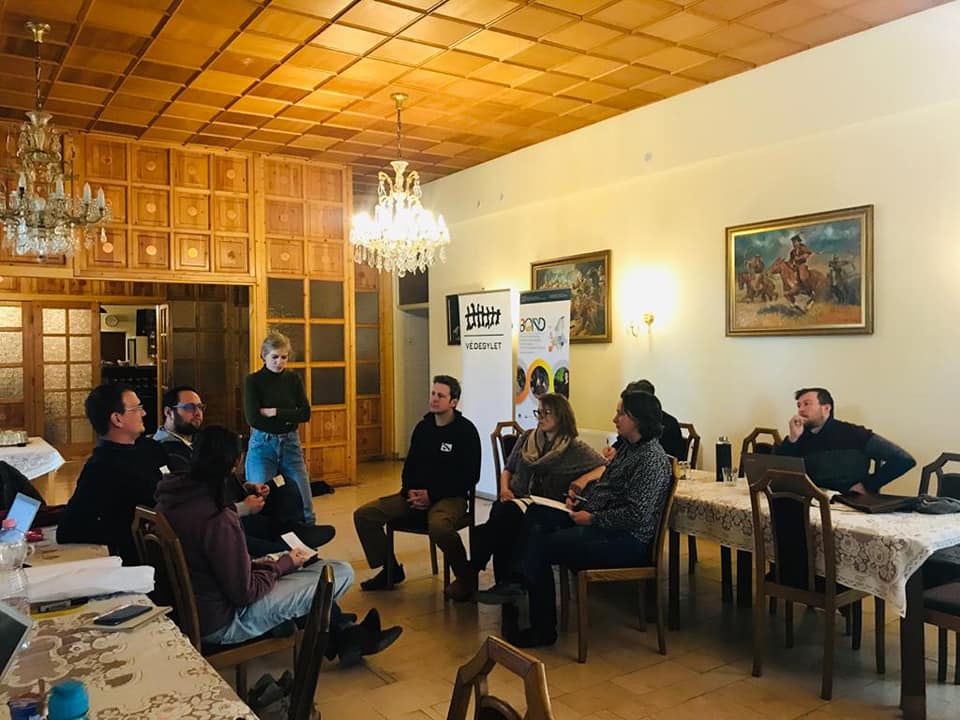Featured on BOND’s website: 2020.04.01.

Between the 6th and the 8th of February 2020 VDG organized a BOND training of trainers in Kishantos, Hungary that addressed men and women engaged in small-scale food production and/or involved in food and agriculture related local groups/associations, with the desire to catalyse co-operations and networks at local, national and regional level.
The general aim of the training was to strengthen collective action for food sovereignty of small-scale farmers and connected people within local and national networks and co-operations. The agenda was tailored to the specific objectives and the expectations expressed by the participants prior to the training, and thus the methodology was adapted were it was needed.
The following objectives were selected:
- Know how to build and strengthen the internal capacities of their organizations;
- Project their vision in the future;
- Build and strengthen fruitful relations with other organizations;
- Relate constructively with other key actors.
The trainers of the event were Lili Balogh, Péter Kajner – both trained at the Training of Trainers in Cordoba, Spain in September 2018 – and Boldizsár Horváth, trained at the Gaming Champions and ToT in Coventry, UK in February 2019. 12 Participants came from Hungary and 1 of Serbia, representing various organisations, shopping communities, seed houses, Community Supported Agriculture associations, a civic platform, NGOs and several farms, in total 13 participants.
During 2 days and a half, the training consisted in nine sessions, starting from principles and values, to organizing/putting in place collective structures and decision-making processes, to lobby and advocacy and finally to communication and networking inside and outside cooperations and networks.
The progress throughout the training was achieved through collective reflection and debates, through presentations and examples sharing from trainers and through learning by doing instruments. The methods varied from debates over given concepts and definitions, to working in groups, analysing visual materials (photographs), negotiation, extrapolation and generalization, brainstorming, and role-play. They had been accompanied by power point presentations and background documents to be revealed progressively during the training.
During the sessions, the participants had the possibility to learn more in depth about the concept of organizations and groups as complex systems, management and leadership, conflict management, cooperative principles and values, and they have acquired skills and knowledge by using actively the following tools: participatory analysis of organizational performance, strategy development and action planning, and communication – different ways of communicating with various actors (e.g. other associations, small-scale farmers, representatives of institutions, mass-media), building and delivering a message.
An important aspect that trainers took into consideration was creating a safe environment for participants to feel included, have space for sharing their own opinions and views, without being judged and a pleasant atmosphere for learning and socializing. Knowing in advance their expectations contributed to understanding ways to transfer information and put in value their knowledge and reduce the gap between each other.
At the end of the training, participants sketched their individual action plan with steps and activities that they want and can be taken in their own area to develop cooperation in their own organizations, community or networks. The plans will have a follow-up in spring 2020.
Feedbacks from participants:
It was interesting, that we were aiming at solving problems that I have been thinking about before – for example what are the strengths are weaknesses that have a role in managing our social mission. I think we got a roadmap for how to overcome obstacles and find those barriers that we need to move. The composition of the group was really good, it was really interesting for me to listen to their comments and experiences. Trainers were loyal, helping participants to come to conclusion, they let us unfold. And we did unfold, smoothly and honestly.
The venue was a great choice, the catering was sufficiently taken care of. Thank you!
Erika Tóth, Hungarian Permaculture Association
First of all, thanks for inviting me to the training. The venue was a good choice for the mentality of the event.
It was good to see how people from different parts of the country see the operation of companies and civil organizations.
Besides the diversity of participants, it also became clear, how similarly we think about the future, we all want to participate and do something to reach our common goals.
The trainings were very practical and active, the trainers professionals.
Thank you for the opportunity.
Regards: Olgi
Olga Rendek Lászlóné, Rendek Eco- farm
When I was at university, I was a member of the AIESEC student organization.
Still until today, I don’t really understand why, because I was an environmental engineer student, and this organization was for economists, but that doesn’t matter now. Yearly, we had 7-8 trainings like this, like your event. As a student, sometimes all this economics talk was weird for me, but as an active farmer I came to realize what important knowledge I gathered during these events. From planning to negotiation techniques, or how to speak in front of a lot of people. These have provided me with invaluable knowledge.
To get to the point, this event was something that all farmers, civil organization leaders and colleagues should participate in, to understand how planning systems work, what it takes to think as a manager. As an associations president, I was thinking a lot during the event, and I went home with more than when I got there. Thank you to Védegylet, and of course the organizers!
Regards,
Attila Fáy, President of the Farmers Organisation of Young Farmers from Borsod

